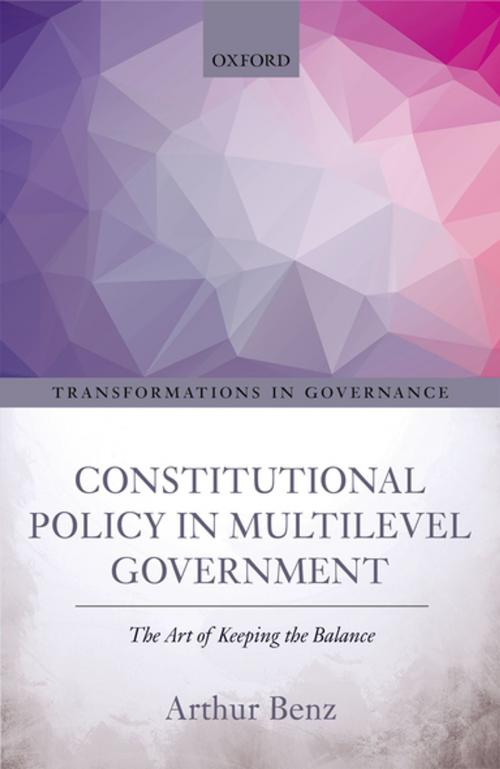Constitutional Policy in Multilevel Government
The Art of Keeping the Balance
Nonfiction, Social & Cultural Studies, Political Science, International, Foreign Legal Systems, Reference & Language, Law| Author: | Arthur Benz | ISBN: | 9780191089220 |
| Publisher: | OUP Oxford | Publication: | July 21, 2016 |
| Imprint: | OUP Oxford | Language: | English |
| Author: | Arthur Benz |
| ISBN: | 9780191089220 |
| Publisher: | OUP Oxford |
| Publication: | July 21, 2016 |
| Imprint: | OUP Oxford |
| Language: | English |
The search for a robust balance of power is a continuous challenge for multilevel political system. Institutions like parliaments or courts can protect the existing order. However, necessary adjustments to economic, social, or international challenges or policies determined to improve ineffective structures or to prevent disintegration require constitutional amendments. Whereas constitutional policy appears as essential to maintain balance, changing a constitution is rather difficult in multilevel governments. Due to the veto power of many actors pursuing divergent interests, policies aiming to redistribute power or fiscal resources risk to end in the joint decision trap. Hence, multilevel government is confronted by a fundamental dilemma. Constitutional Policy in Multilevel Government compares processes of constitutional reform in federal and regionalized states. Based on a theoretical framework emphasizing the relevance of negotiations in parliamentary, intergovernmental, and societal arenas, it identifies conditions for successful reforms and explains the consequences of failed reforms. Moreover, it highlights the interplay of reform processes and constitutional evolution as essential to maintaining a robust balance of power. The book demonstrates that an appropriate arrangement of multiple arenas of negotiation including executives, members of parliament and civil society organizations, and sequential order of reform processes proves fundamental to prevent federal or regionalized governments from becoming either instable or ending with rigid constitutions. Transformations in Governance is a major new academic book series from Oxford University Press. It is designed to accommodate the impressive growth of research in comparative politics, international relations, public policy, federalism, environmental and urban studies concerned with the dispersion of authority from central states up to supranational institutions, down to subnational governments, and side-ways to public-private networks. It brings together work that significantly advances our understanding of the organization, causes, and consequences of multilevel and complex governance. The series is selective, containing annually a small number of books of exceptionally high quality by leading and emerging scholars. The series targets mainly single-authored or co-authored work, but it is pluralistic in terms of disciplinary specialization, research design, method, and geographical scope. Case studies as well as comparative studies, historical as well as contemporary studies, and studies with a national, regional, or international focus are all central to its aims. Authors use qualitative, quantitative, formal modeling, or mixed methods. A trade mark of the books is that they combine scholarly rigour with readable prose and an attractive production style. The series is edited by Liesbet Hooghe and Gary Marks of the University of North Carolina, Chapel Hill, and the VU Amsterdam, and Walter Mattli of the University of Oxford.
The search for a robust balance of power is a continuous challenge for multilevel political system. Institutions like parliaments or courts can protect the existing order. However, necessary adjustments to economic, social, or international challenges or policies determined to improve ineffective structures or to prevent disintegration require constitutional amendments. Whereas constitutional policy appears as essential to maintain balance, changing a constitution is rather difficult in multilevel governments. Due to the veto power of many actors pursuing divergent interests, policies aiming to redistribute power or fiscal resources risk to end in the joint decision trap. Hence, multilevel government is confronted by a fundamental dilemma. Constitutional Policy in Multilevel Government compares processes of constitutional reform in federal and regionalized states. Based on a theoretical framework emphasizing the relevance of negotiations in parliamentary, intergovernmental, and societal arenas, it identifies conditions for successful reforms and explains the consequences of failed reforms. Moreover, it highlights the interplay of reform processes and constitutional evolution as essential to maintaining a robust balance of power. The book demonstrates that an appropriate arrangement of multiple arenas of negotiation including executives, members of parliament and civil society organizations, and sequential order of reform processes proves fundamental to prevent federal or regionalized governments from becoming either instable or ending with rigid constitutions. Transformations in Governance is a major new academic book series from Oxford University Press. It is designed to accommodate the impressive growth of research in comparative politics, international relations, public policy, federalism, environmental and urban studies concerned with the dispersion of authority from central states up to supranational institutions, down to subnational governments, and side-ways to public-private networks. It brings together work that significantly advances our understanding of the organization, causes, and consequences of multilevel and complex governance. The series is selective, containing annually a small number of books of exceptionally high quality by leading and emerging scholars. The series targets mainly single-authored or co-authored work, but it is pluralistic in terms of disciplinary specialization, research design, method, and geographical scope. Case studies as well as comparative studies, historical as well as contemporary studies, and studies with a national, regional, or international focus are all central to its aims. Authors use qualitative, quantitative, formal modeling, or mixed methods. A trade mark of the books is that they combine scholarly rigour with readable prose and an attractive production style. The series is edited by Liesbet Hooghe and Gary Marks of the University of North Carolina, Chapel Hill, and the VU Amsterdam, and Walter Mattli of the University of Oxford.















